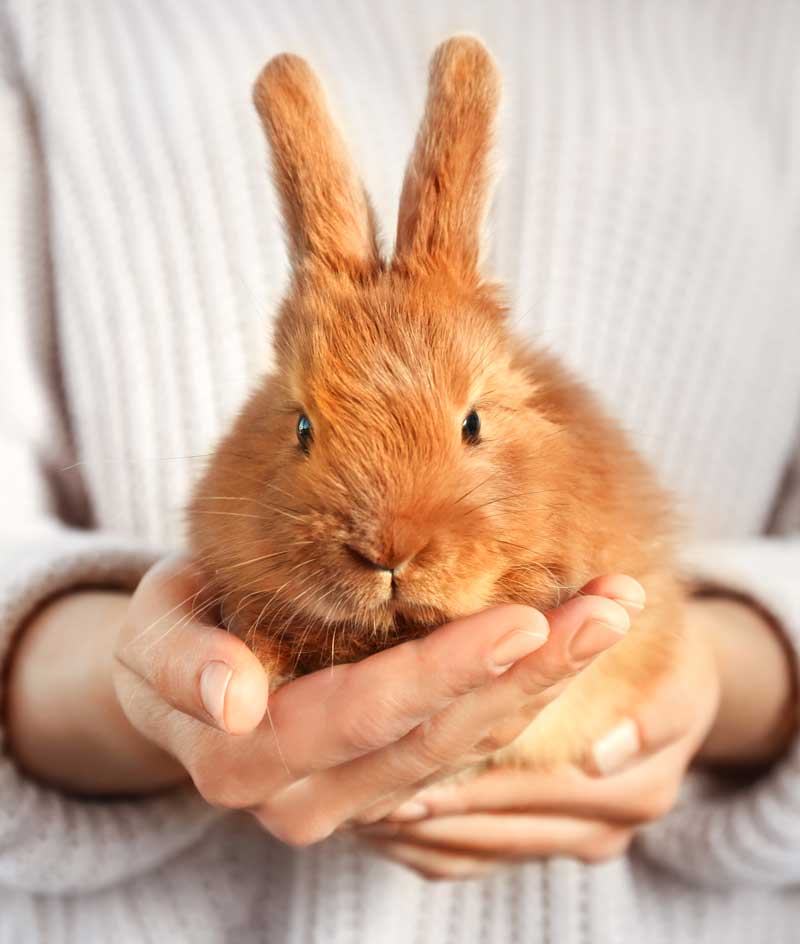Rabbits as Pets
Every year in late spring, unwanted rabbits fill local rabbit rescues and humane societies. Live "Easter Bunnies" should not be purchased for children unless the parents are willing to make a 10-year commitment to properly care for the animals. Those cute fluffy bunnies soon grow large and reach adolescence. Caring for a bunny is just as demanding as having a dog.
A rabbit makes a good pet if well cared for, as they are usually gentle, quiet animals. However, a rabbit may scratch, bite, or kick if frightened. Each one has a unique personality and will become tame and friendly with gentle handling. When picking up a rabbit, always support the hindquarters. They have powerful hind leg muscles and can easily injure their back and spine.
Rabbits belong to a group of animals called lagomorphs and are not rodents. Wild rabbits like cottontails and jackrabbits do not adapt well to captivity, can carry diseases, and are illegal to keep because they are native wildlife. There are about 45 different breeds of rabbits, including various types of dwarf, rex, lop, and angora breeds. When selecting a pet rabbit, a breed that looks most similar to a wild rabbit usually has fewer health problems. Short fur, a long face, and upright ears avoid many costly diseases pet rabbits can develop.
Rabbits must be confined to a large hutch or cage when not supervised. Rabbits like to explore their surroundings, so you must rabbit-proof your house to prevent inquisitive nibbling on wood furniture, electrical cords, and toxic houseplants. Rabbits are playful and need safe toys such as cardboard tubes, safe wooden toys, or PVC tubing. Environmental temperatures should be kept under 80 degrees because they are susceptible to heatstroke. Litter box training can improve cleanliness.
After purchasing a rabbit, it should be examined immediately and annually to screen for any early signs of health problems. Dental disease can occur at any age, and some breeds are more prone to this. Spaying and neutering should be done before puberty (4-6 months of age) to prevent reproductive problems like uterine cancer and to reduce aggressive behavior.
Rabbit stools should be produced frequently, and should be large, round, dry pellets. Any decrease in the frequency or volume of stools is a sign of trouble, and a dietary imbalance is usually the cause of dark sticky stools on the rabbit or in the cage.
Feeding the proper diet will prevent most common medical problems. Your rabbit should be offered large amounts of coarse clean grass hay (timothy or Bermuda) daily. Alfalfa hay and pellets should be fed only for the first 6 months and then converted completely over to the grass hay diet, which has less energy. Timothy pellets can be fed to adult rabbits if they contain a minimum of 20% fiber and a maximum of 16% protein.
To prevent obesity and encourage hay consumption, do not feed more than 1/4 cup pellets per 5 pounds of rabbit per day. Most rabbits do best on a full hay diet with no pellets. Small amounts of vegetables can be introduced as treats. Fancy pellet mixtures with added nuts, seeds, and dried fruit are readily eaten by rabbits but are too high in energy and can encourage the growth of abnormal bacteria, leading to sudden death.
Fiber is such an important part of a rabbit's diet. It stimulates normal intestinal movement, supports the growth of normal, healthy bacteria in the cecum for proper digestion, and prevents the overgrowth of dangerous bacteria. A high-fiber diet is also necessary for the cheek teeth to wear properly. Grass hay with fewer leaves and more stems is actually best to feed to rabbits because it has higher fiber content and is lower in energy.
If you decide to get a rabbit, consider adopting one from a shelter. Owning a rabbit can be fun and rewarding, and they have become a popular pet. With proper feeding and care, rabbits can provide many years of enjoyment.
By Hillary Frank, DVM, Dipl. ABVP (Avian)
Hillary Frank, DVM, Dipl. ABVP (Avian) is a veterinarian at North Central Animal Hospital. She can be reached at (602) 395-9773. This article is provided as general information only. For specific advice on your pet's health, call us for an appointment or consult your veterinarian.

